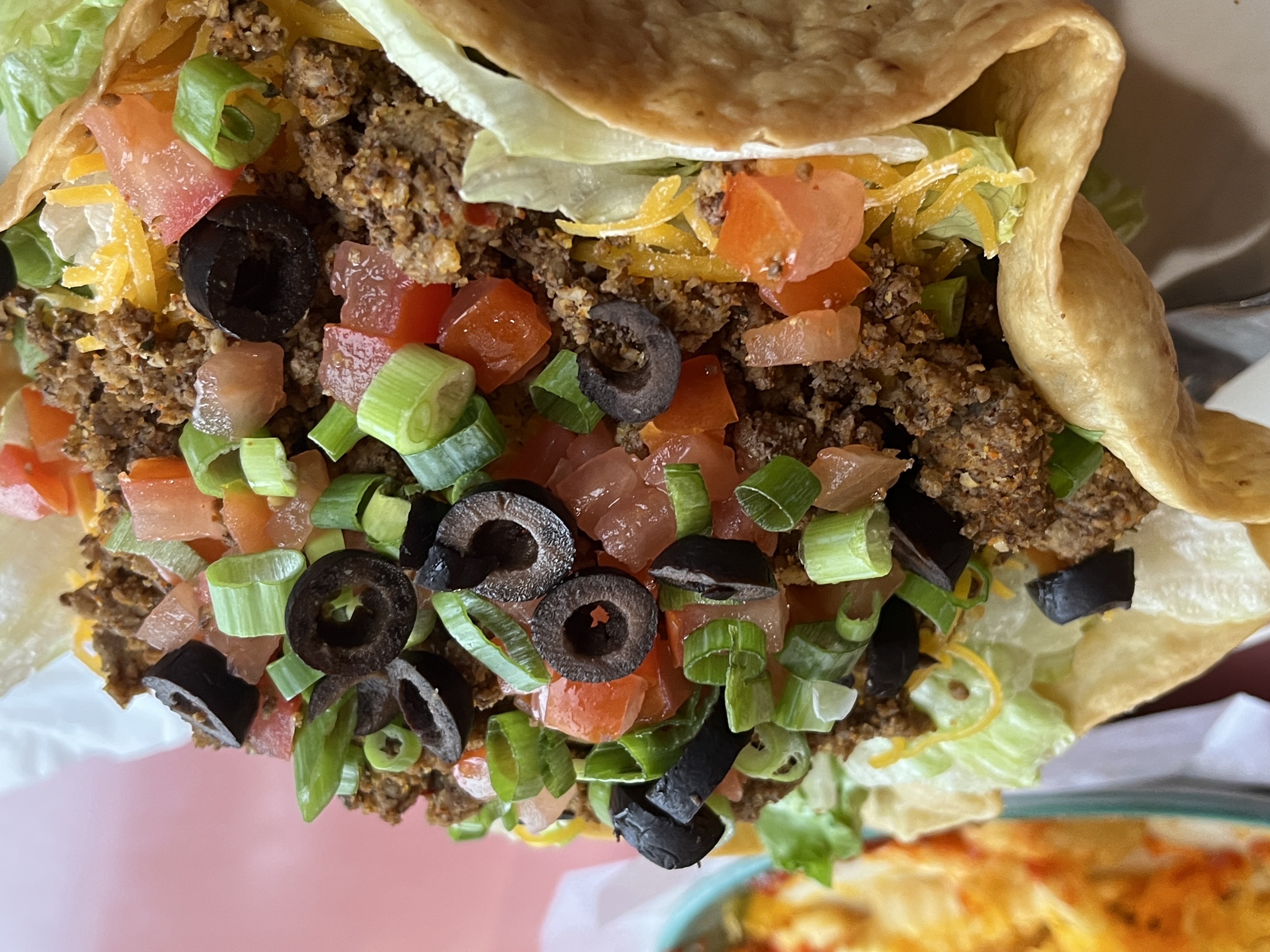Chapter 1—The Fries
Marysville, 9/3/2023 around 4:00 PM
Jonah and I had just taken the 512 to the 202 and arrived in Marysville, where we spent half an hour debating whether to purchase a fancy toaster and a copy of Windows XP from a thrift shop. At this point in our trip, we were growing hungry and our only option was to search for food.
We found numerous restaurants, but decided to try out Don's Diner. With a vintage appeareance from the outside, we didn't know whether this restaurant was timeless or just really really old but we were greeted by a very friendly waitress. There was a relatively aged man in the restaurant, but not any others.
At exactly 4:58 PM we ordered our meal—an appetizer of cheese fries, a taco salad for me, and a ceasar salad with grilled salmon for Jonah. At this point, nothing seemed unusual. 5 minutes later we received the cheese fries, which we chowed down on. The fries were crispy, and paired very well with the gooey cheese. Roughly 8 minutes later, the old man left. 16 minutes after that (or 21 minutes after we initially ordered) our entrées arrived.

You might be wondering, what happened in those 16 minutes? Well at the time we didn't know either. We just continued enjoying our meal, with the deadline of 6:44 (when the 201 returns to Everett) very slowly creeping up.
Roughly halfway through eating our meals, the waitress stops by our table and informs us of a seemingly unrelated fact, the old man's house recently burnt down entirely. We were both very sorry to hear that, but she continued—the old man regularly visits Don's Diner around that time of day, and occasionally brings his grandchildren with him and is well-acquainted with the staff. Finally, the lady mentions something else, that the old man paid for our cheese fries entirely, without knowing that we had also ordered entrées, and had left us with an uplifting message telling us that even if things don't seem up now we have our whole lives ahead of us and we shouldn't ever give up.
This is not a problem, we're both super happy about it and Jonah wants to pay for something of his in return, but since he already left we were unable to. The debate starts when Jonah texts me later, saying he feels guilty for the cheese fries being paid for by the man because the man clearly needed the money significantly more than us.
Chapter 2—The Debate
Our respective houses, 9/3/2023 around 10:00 PM
I argue that since the man gifted us the cheese fries by paying for them, feeling guilty about it is destroying the gift. Jonah argues that since the man needed the money so much more than us, we should feel guilty because there was nothing we did in return, in fact, since he left after paying, we weren't even able to thank him.
Neither of us thought anyhting of it, it was nothing more than $5 and the fries were quite tasty. One thing didn't change though—we never came to a consensus on whether or not we should've felt guilty.
Chapter 3—Effective Altruism and the Downfall of FTX
My bedroom, 3/3/2023 around 5:34 PM
I learned about Effective Altruism (and how it connects FTX) months beforehand, from a super interesting Philosophy Tube video you should totally watch.
Effective altruism is a philanthropic movement aiming to achieve the most impact on the as many people as possible. It is a community of people who share this belief and support each other to achieve maximal impact on the world. At the movement's core is the principal of giving away as much wealth as possible.
This sounds like a really good philosophy, but while Effective Altruism has been for its evidence-based approach to doing good, it's a PR move for billionaires due to the movement's strong emphasis on quantifiable, short-term impacts. This means it neglects long-term outcomes in favor or easily measurable improvements—which are much easier to bolster PR with. The movement is also falsely pro-morality and ethics, because by donating to maximize outcome you remove the personal passion and commitment in altruistic actions. This brings us to Sam Bankman-Fried.
Chapter 4—Oil-Fried or Bankman-Fried?
743 Cooksey Ln, 8/11/2023 around 6 PM
Sam Bankman-Fried, in case you're not aware, was the CEO of FTX—a cryptocurrency exchange. FTX went from being a company with a US division valued at $8 billion to a disastrous collapse that resulted in Bankman-Fried being imprisoned.
According to Bankman-Fried, his involvement in Effective Altruism influenced his decision to create FTX, as he saw an opportunity to generate more income for philanthropy by providing a better service for crypto traders. In 2020, FTX donated $5 million to GiveDirectly, a charity that provides cash transfers to people living in extreme poverty. In 2021, FTX donated $10 million to The Good Food Institute, a nonprofit that supports the development of plant-based and cultivated meat alternatives.
Unfortunately, philanthropic ambitions are not the only thing needed to run a successful business and after spending more than half its customer's funds to keep its sister compant—Alameda Research (a company also set upon donating millions to effective causes)—afloat, they could not recover when Binance sold all of its FFT tokens (the primary cryptocurrency used by FTX).
So, while the Effective Altruism movement seems like a method through which billionaires (or in this case, former billionaires) can do good, it also neglect s important moral considerations and incentivizes harmful actions in pursuit of maximizing publicizable impact.
Chapter 5—In summary, Jonah is WRONG
My bedroom, 9/20/2023 around 5:44 AM
The debate Jonah and I had was quite a profound one and it got me thinking about ties between the cheese fries and Effective Altruism. To start, the man who paid for our cheese fries was likely not thinking about Effective Altruism in the moment, since paying for our cheese fries is just about the least impact possible you can create with $5. Although, this article is getting written now and maybe because of that the man actually created a future utopia. But that's not for this article.
We may never know why the man made the altruistic choice to pay for our cheese fries, but what we do know is that we we were physically much closer to the man than, say, Mary’s Place in Seattle. This could've been a possible factor for why he made the choice, or maybe we just reminded him of other people he knew. Either way, the action was clearly motivated by emotions and not Effective Altruism.
This brings me to the final section of this article, why Jonah is wrong. Jonah originally argued that it's reasonable to feel guilty because the man obviously needed the money more than us, but as we just saw above, that's the initial idea that turns donators into Effective Altruists and Jonah is better than that. By feeling guilty that the man paid for our fries, we destroy the gift of the $5 and at that point it would be better for the man to keep the money, but by enjoying the cheese fries and spreading the positive message—the gift was fully worth the $5 and the man did not pay for our cheese fried in vain.
I'm not asking you to pay for other peoples' cheese fries, but if a stranger pays for yours, never feel guilty.
Bibliography
- https://www.effectivealtruism.org/
- https://www.forbes.com/profile/sam-bankman-fried/
- https://www.theatlantic.com/ideas/archive/2022/11/cryptocurrency-effective-altruism-ftx-sam-bankman-fried/672149/
- https://www.bostonreview.net/forum_response/response-daron-acemoglu/
- https://www.newyorker.com/news/annals-of-inquiry/sam-bankman-fried-effective-altruism-and-the-question-of-complicity












